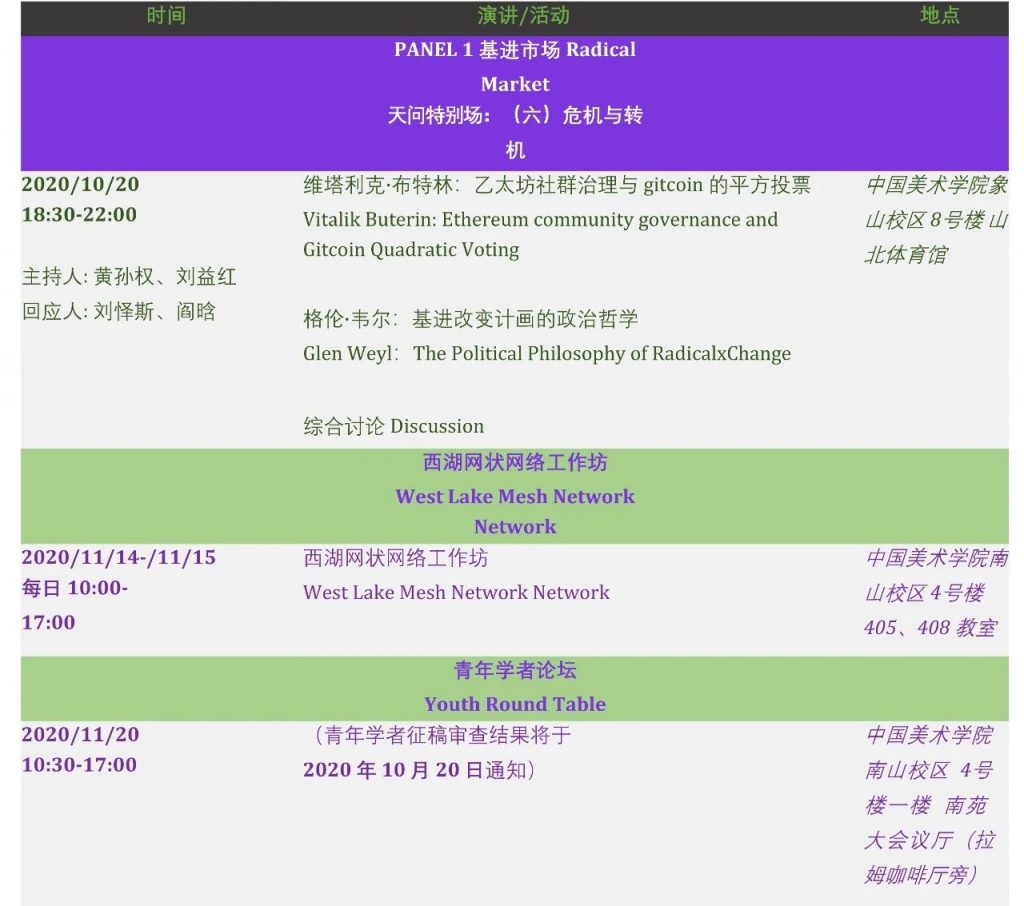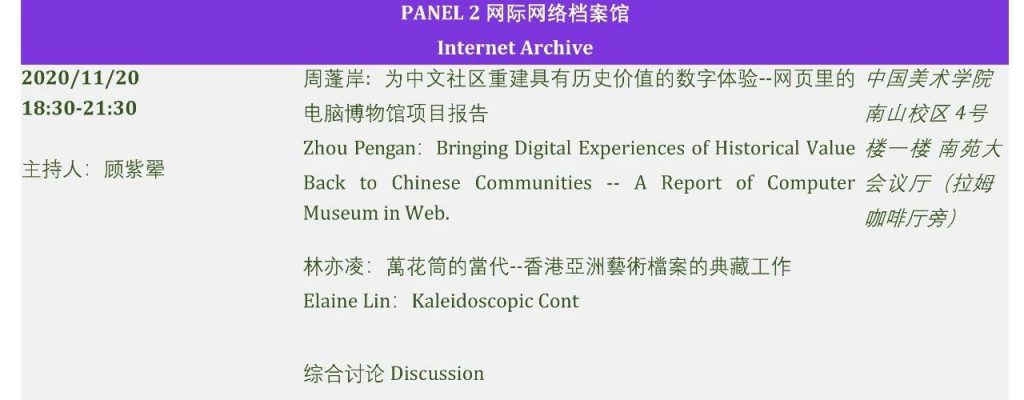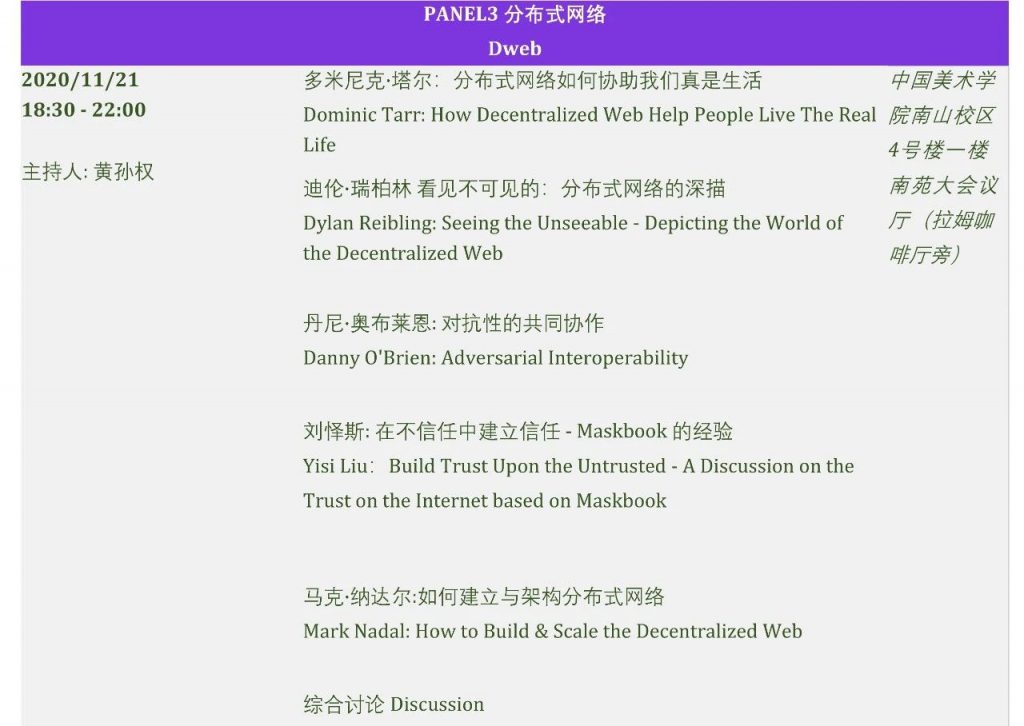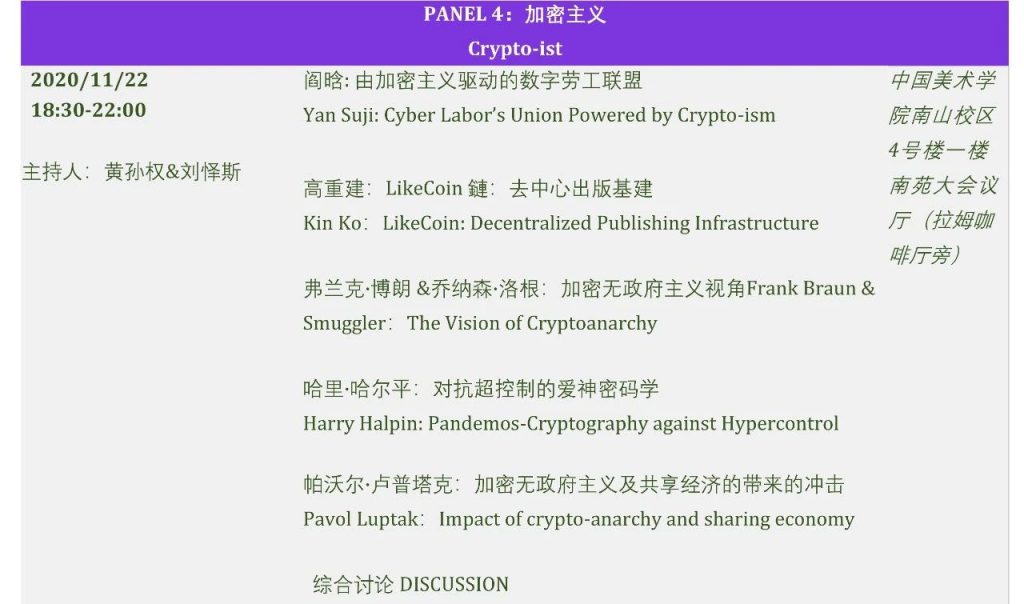
18 Oct 2020第五届网络社会年会“实践智慧之网”
学术委员会
高世名教授,管怀宾教授,黄孙权教授
召集人
黄孙权&刘怿斯
主办
中国美术学院
跨媒体艺术学院
视觉中国协同创新中心
承办
中国美术学院网络社会研究所
协力
上海极粟信息科技有限公司
dWeb Shanghai
工作团队
崔雨、张晋珲、房梓、蒋雨航、汤睿沄、杨弘毅、许丹玲、宋建骅、郑叶颖、张述轩、陈俞如
视觉设计
偏飞设计事务所:周泽源
—
报名方式


新冠疫情的全球扩散看似令资本主义喘息暂止,实则令监控资本主义顺而昂起。今天,由于病毒管控及为了人们健康,线上世界数位政权拥有绝对正当权力,线下世界的人们面临严密的监控和个人行为资讯的搜集。
假设实践(praxis)产生的实践智慧(phronesis)可以使人之行动揭蔽(aletheuein),以达操心的环视(solicitous circumspection)的效果。那么,为了践行亚里士多德所谓的“善用技术(techne)”,我们需要在实践智慧的指导下筹划和选择,以利用那些对揭露真理有重大缺陷,无法去蔽的,处在自身之外的技术。本次年会意在将(有所行动的)思想当作制作技术的始点,以便我们开启针对全球技术扩散与集中并行的讨论;去创造有分枝的未来,以谋求在病毒与治理紧急状态下的新生活。
过往四届年会,“网络的力量”(2016),“与列斐弗尔同行:算法时代下的都市与日常生批判”(2017),“智慧都市网络”(2018)和“网民21:超越个人帐户”(2019)中,我们连结了各国专家学者与行动者,开展了当前网络社会的理论批判与行动网络。第五届网络社会年会以“实践智慧之网”为题,探讨技术实践下之社会困境,透过吾人与世界之爱与想像的交往,如何创造了无限分枝的生活。
—
Panel 1
基进市场
天问特别场第六场 危机 | 转机
时间:2020/10/20 (週二) 18:30-21:30
地点:中国美术学院象山校区 8号楼 山北体育馆
主持人:黄孙权&刘益红
回应人:刘怿斯&阎晗
生产力降低、经济停滞、冲突与不均的全球危机现象,乃因资本主义内在的掠夺性积累、垄断、分配不公以及社会制度的民主表达机制不良,劳动力流动限制与移民政策等所造成。“基进市场”是一场迈向基进改变的思想实验,以之筹划经济、社会、资讯技术的由下而上的未来方案,同时考虑到自由市场的配置效率与投资诱因,成为社会性共好的转机。什么是当下危机的关键问题?如何在自由经济与国家在长期风险管控方面的经济干预之间取得平衡?现代社会如何应对与系统复杂性正相关的伴生风险?
主题演讲者:
以太坊创始人 维塔利克·布特林 Vitalik Buterin
《基进市场》作者,微软政治经济与社会技术部门首席执行官 格伦·韦尔 Glen Weyl
—
西湖网状网络工作坊
时间:2020/11/14─11/15 (周六、周日)10:00-17:00
地点:中国美术学院南山校区 4号楼405、408教室
组织者:dWeb Shanghai
如果有一天世界上再没有商业互联网可用,我们将如何与彼此沟通?在dWeb Shanghai带领下,网状网络工作坊将以小组协作方式制造自己社群的互联网。本次工作坊为期两天,第一天,参与者将动手制作机器,并将其装配在南山校区4号楼。第二天则将被用于分组内容规划及将此互联网打造成原型。在年会期间,全校师生及年会参与者们将会拥有自己专属的无线网络乌托邦。这将是中国第一场于西湖畔边诞生的网状网络实验。
这个网络里,志愿者们可以相互分享城市内各自所处位置的温度、湿度、空气质量等信息,而完全无需依赖于付费的由网络服务提供商(ISP)所提供的网络。
全球网状网络组织如今正在更新“社区”、“共享”与“附近”的概念。它们在全球南方,非洲、印尼、墨西哥,加拿大与欧洲都很常见。德国的Freifunk有四百多个无线社区、英国的蓝开夏B4RN有光纤到府服务;加拿大的guifi.net可能是欧洲最大的社区网络,它遍及整个西班牙,正被上万人透过wifi和光纤使用,其中包括志愿者、非营利组织、公共管理和小的媒体公司等。Sarantaporo这个在希腊奥林匹亚山脚下的非营利农村组织建立于2010金融危机后。当时,当地年轻人为救家乡自行搭建无线网络,如今此网络正服务着超过10个村子的5000多位村民,人们通过使用app获得新知、相互交易。此组织更是于2019年获得“欧洲最佳宽带奖”(European BroadbandAwards)。而像法国的FFDN则是包含许多社区网络的大组织。
没有一个网状网络是完全相同的。它们遍及都市,甚至覆盖着乡村、贫民窟和移民社区。有的地区因为连网太贵或者服务太差的原因网速不行。除了连结性的需要,网络的搭建也有哲学、经济、社区和个人动机等各不相同的原因。 总之,网状网络所属的范畴是去中心化网络,即通过切断与中心化的网络服务提供商的依赖,成为真正为用户所有的网络。也可以说,去中心化网络将我们从巨头垄断的世界中解放出来,让我们可以获得自治的自由。
工作坊详情请见:
—
青年学者论坛
时间:2020/11/20 10:30-17:00
地点:中国美术学院南山校区 4号楼一楼 南苑大会议厅(拉姆咖啡厅旁)
本次年会是技术与思想的大会。我们追问行使技术背后的经验及其累积的智慧,以谋求更好的未来。除了一个工作坊与四个主题演讲外,网络社会研究所现热切邀请国内外青年学者与有志思想实验之士踊跃投稿,分享自己的研究成果与对未来的雏议。此次投稿者众多,经审慎评估,学术委员将从来稿者中选出十位年轻学者,从哲学、艺术、社会化技术等层面扩展实践与思考,并邀请入选者至现场发表与相互对话。
Panel 2
网际网络档案馆
时间:2020/11/20 18:30-21:30
地点:中国美术学院南山校区 4号楼一楼 南苑大会议厅(拉姆咖啡厅旁)
主持人:顾紫翚
那些经由历史过滤而被呈现出的真相总是事实的注脚,受限于当下社会现实。从1996年网际网络档案馆成立至全球美术馆博物馆开始为艺术品建制数字档案的今天,互联网产生的资料已远超过人类有历史以来的总量。发展当代人类历史文明被记录和归档的技术,是人类历史技术化/体外化最艰难的挑战。档案(archive)最重要的是权力制订的文献分类,每个档案馆执政官“分类”的原则,也就是历史的可触及的材料,他们决定了历史。无限自动保存的网际网络资料库意味着所有幽隐之物,删节之物,都会以光电物质储存,人类文明没有缺失,意识形态与文化的偏见无法过滤历史材料,历史无法纠正,甚至无法书写,只能被纪录。考古学与考现学的共同根源,发现文献与档案间的权力分配中没有皇帝了,然而取代权力的搜寻算法以及后设资料(metadata)的新史官是谁?我们现在还很模糊。
主题演讲者
中文世界第一个在线交互式电脑博物馆创始 周蓬岸
Arweave 联合创始人兼首席执行官 山姆·威廉姆斯 Sam Williams
香港亚洲艺术文献库AAA 数位典藏负责人 林亦凌
Panel 3
分布式网络
时间:2020/11/21 18:30-21:30
地点:中国美术学院南山校区 4号楼一楼 南苑大会议厅(拉姆咖啡厅旁)
主持人:黄孙权
今天,被多寡头统治的互联网病了吗?面对这一病态,我们如何创造爱与包容、开放与私密并存且人人皆受欢迎的网络世界?在去中心化网络运动中,人们除了讨论技术的革新,更重视网络与人类社会的关系——不是为去中心化而去中心化,而是为帮助人类进步、为人民带来更多便利、减少伤害与不便而发展的去中心化。去中心化网络从来都是欢迎所有人的,因为互联网就是一个全人类都可以直接参与的创造,这意味着不论你是律师、教师、足球运动员或者是商店售货员,只要你使用网络且有自己的思考,你就可以参与讨论和设计更好的网络,而遍及全球的分布式网络的实践者们也正是在已经发生的未来图谱中如此进行着建筑。
主题演讲者
通过太阳能发电在船上写代码的的协议设计者,scuttlebutt的创始人 多米尼克·塔尔 Dominic Tarr
电影导演,交互艺术家 迪伦·瑞柏林 Dylan Reibling
电子前沿基金会 EFF 策略长 丹尼·奥布莱恩 Danny O’Brien
dWeb Shanghai小组成员,Dimension 技术长 刘怿斯
数学家、程序员,开源公司ERA、Gun的创始人 马克·纳达尔 Mark Nadal
Panel 4
加密主义
时间:2020/11/22 18:30-22:00
地点:中国美术学院南山校区 4号楼一楼 南苑大会议厅(拉姆咖啡厅旁)
主持人:黄孙权&刘怿斯
网络隐私与安全是基本人权,现在,这一人权正被那些云端计算能力大幅提升的垄断性社交媒体剥夺。对网民来说,拿回丧失的权利将是一场社会和经济的双重革命。在过去十年里,为这一革命做准备的技术已有大幅进展。它们包括公钥加密、点对点加密传输,零知识证明以及各种用于互动、认证和验证的软件协议等。无论如何,我们都将是为了保障隐私与维持自由的加密主义者,或者被加密主义者主宰。
主题演讲者
LikeCoin创始人 高重建
Dimension创始人 阎晗
加密无政府主义者,Cypherpunk Bitstream联合创始人 弗兰克·博朗 Frank Braun & 乔纳森·洛根 Smuggler
Nym Technologies首席执行官 哈里·哈尔平 Harry Halpin
加密无政府主义者,Nethemba创始人,Hacktrophy联合创始人 帕沃尔·卢普塔克 Pavol Luptak

The Fifth Annual Conference of Network Society: The Web of Phronesis
TIME
2020/10/20;
2020/11/14-11/15;
2020/11/20-11/22
VENUE
Shanbei Gymnasium (BLD.8), Xiangshan Campus, China Academy of Art, Hangzhou;
Room 405,408, BLD.4, Nanshan Campus, China Academy of Art;
Nanyuan Auditorium, 1F Building 4, Nanshan Campus, China Academy of Art.
CONVENER
Prof. HUANG Sunquan & LIU Yisi
HOST
Institute of Network Society, CCVS, SIMA, China Academy of Art
CO-ORGANIZER
Dimension Inc. dWeb Shanghai
COMMITTEE
Prof. GAO Shiming,Prof. GUAN Huaibin, Prof. HUANG Sunquan
ENROLL


While capitalism seems to be generally frustrated with the global spread of the Covid-19, surveillance capitalism has secretly risen with the virus explosion. In the name of security, a centralized digital regime with unchallengeable legitimacy power is now strictly monitoring people, which seems to bring about an information centralized online society.
Aristotle indicates that the ‘phronesis’ (wisdom of praxis) produced by praxis can lead people to ‘aletheuein’ and to achieve the ‘solicitous circumspection’. It means that there should be phronesis to manage the use of techne, so that the techne with major flaws in revealing the alethea (truth) but outside itself could be made the best use of. According to this, we assume that to take the thought (with action) as the starting point of the techne production would construct the future of humans under the Covid-19 state of emergency. We believe that the starting point would be able to trigger discussions that go beyond proliferation and concentration of global technology, therefore forks our futures.
In the previous Annual Conferences “Forces of Reticulation” (2016), “Another Walk with Lefebvre: Critique of Urbanism and Everyday Life in the Algorithmic Age” (2017), “Intelligent Urban Fabric” (2018) and “Neitizen21: Beyond Personal Account” (2019), INS connected worldwide scholars and activists to construct criticism toward current network society and explore a network of practices together. The fifth annual conference, the Web of Phronesis, tries to explore technical practices hindered by social dilemma, and to review the life of infinite branches created by love between we and the world along with imaginations.
—
PANEL I: RADICAL MARKET
2020/10/20 Tuesday 18:30-21:30
VENUE
Shanbei Gymnasium (BLD.8), Xiangshan Campus, China Academy of Art, Hangzhou
MODERATOR
Huang SunQuan & Liu Yihong
COMMENTARY
Liu yisi & Yan Suji
The global crises of declining productivity, economic stagnation, conflict and inequality are caused by the inherent predatory accumulation, monopoly, and inequitable distribution of capitalism, as well as the poor democratic mechanism, restrictions on labors and immigrants’ mobility. The “radical market” is a thought experiment seeks “radical change”, in order to plot the bottom-up economic, social, and informational technology plans of future, taking into account the allocation efficiency of the free market and investment incentives at the same time, and turning crisis into opportunities for the common good. What are the critical issues of the current crisis? How to strike a balance between a free economy and state economic intervention in long-term risk management? How does modern society deal with the associated risks that are positively correlated with its system complexity?
KEYNOTE SPEAKERS
Vitalik Buterin(Founder of Ethereum)
Glen Weyl(Author of ‘Radical Markets’,Principal Researcher at Microsoft Research New England)
This session is also the ‘Panel 6: Crisis-Change’of the ‘Inter-World-View Hangzhou China 2020’
—
WEST LAKE MESH NETWORK WORKSHOP
2020/11/14─15 Saturday、Sunday 10:00-17:00
CONVENOR
dWeb Shanghai
VENUE
Room 405,408, BLD.4, Nanshan Campus, China Academy of Art
REFERENCES
How could we keep in touch without commercial internets? With technical supports of dWeb Shanghai, attandees of the workshop will try to set up wireless internet in groups at Building 4, Nanshan Campus, China Academy of Art. In this two-day workshop, participants are going to install the equipments on Day1, then design and set up the internet on Day 2. Like an utopia, this wireless network should be able to get accessed by all people in Nanshan campus until the end of the fifth annual conference. It will be the first experiment of setting up Mesh Network around the West Lake, Hangzhou, in China.
The mesh network will be come a platform recording the weather of participants’ locations such as the temperature, the humidity and qualities of the air, with no need to pay for the internet provided by ISP.
The DIY of mesh network all around the world is updating knowledge about the ‘communities’, the ‘sharing’ and the ‘nearby’.
Freifunk in Germany covers over 400 wireless communities; B4RN in Lancasire is now serving UK government with optical fiber. As a community network, the coverage of guifi.net in Europe is probably the widest. Tens of thousands of Spanish people including volunteers, non-profit organizations, public management organizations and media companies are served by this network.
A non-profit organization in the rural area at Mount Olympus in Greece, Sarantaporo, have been established for saving the community from financial crisis in 2010 by local youths since 2013. The wireless mesh network they DIY’ed is now serving over 5000 residents in more than 10 villages. People exchanges views and goods on the applications, which help the organization won the European BroadbandAwards in 2019. FFDN in France is a combination of community networks.
All the mesh networks are distinguished from the others. The networks are covering not only urban areas, but also rural areas, slums and immigrants communities. The motivations to set up the mesh networks are different, whereas all the networks could be defined as decentralized webs. The webs belong to users rather than commercial internet service providers, they liberates individuals from digital oligarchy and empower the autonomy of users.
—
YOUTH ROUND TABLE
2020/11/20 Friday 10:30-17:00
VENUE
Nanyuan Auditorium, 1F Building 4, Nanshan Campus, China Academy of Art
The Web of Phronesis focuses on not only praxis, but also theories. To architect a better future, we try to review the intelligence and experiences gained by technology using. In addition to a workshop and four panels, we called for papers from young scholars and people with faiths all around the world, holding the Youth Round Table. In this session, there will be ten presentations from the scholars carefully evaluated and selected by the committee. Selectees are going to present on the spot, discussing with each others and expand their practice and thinking from the philosophical, artistic, socialized and technical levels.
—
PANEL II: INTERNET ARCHIVE
2020/11/20 Friday 10:30-17:00
VENUE
Nanyuan Auditorium, 1F Building 4, Nanshan Campus, China Academy of Art
The Web of Phronesis focuses on not only praxis, but also theories. To architect a better future, we try to review the intelligence and experiences gained by technology using. In addition to a workshop and four panels, we called for papers from young scholars and people with faiths all around the world, holding the Youth Round Table. In this session, there will be ten presentations from the scholars carefully evaluated and selected by the committee. Selectees are going to present on the spot, discussing with each others and expand their practice and thinking from the philosophical, artistic, socialized and technical levels.
—
PANEL II: INTERNET ARCHIVE
2020/11/20 Friday 18:30-21:30
VENUE
Nanyuan Auditorium, 1F Building 4, Nanshan Campus, China Academy of Art
MODERATOR
Katt Gu
The truths history narrates could always be footnotes to the facts. They are quarantined by the reality of the time. Since the establishment of the Internet Archive in 1996, information generated by the Internet has far exceeded the total amount of human history. Today, digitized files and metadata records have become the main issue of art museums and galleries. Under this circumstance, to preserve, to record and to file human civilization are critical challenges to technicalize and to externalize human history.
The ‘archive’ is accumulation of documents cataloged by authorities. Under this circumstance, it is the method to catalog, operated by archivists, made up the narrative of human history.
The automatic digital archives are now saving the hidden and the deleted to photoelectric media. Under this circumstance, human civilization resists the absence, which means ideologies and bias on cultures can do nothing to question recorded truths, and people have no power are not allowed to correct or even to simply write a history. The shared root of modernology and archaeology found that there is no authorities presently but only searching algorithm and the metadata in our age. It seems like we are living in a time without archivist.
KEYNOTE SPEAKERS
Zhou Pengan(Founder of the first interactive online computer museum in China)
Elaine Lin (Head of Collections at Asia Art Archive)
Sam Williams(CEO & Co-Founder at Arweave)
—
PANEL III: DWEB
2020/11/21 Saturday 18:30-21:30
VENUE
Nanyuan Auditorium, 1F Building 4, Nanshan Campus, China Academy of Art
MODERATOR
Huang SunQuan
Should Internets owned by oligarchs? How to create Internet in which inclusive love could stand, publicness would be compatible with privacy, and everyone would be welcomed? When decentralizing, people are exploring the relationship between networks and human society rather than simply updating technologies. Decentralizing is not for the sake of decentralization, but for benefiting human societies, to decreased harms and inconveniences that digital orligarchy have made. Decentralized internets should be open to all the people, because that is what Internet was originally made for. In this panel, practitioners of Decentralized Web will be invited to share their experiences on architecting in the atlas of the future has already taken place.
KEYNOTE SPEAKERS
Dominic Tarr(Javascript Cyberhobo and computer wizard,Co-founder at scuttlebutt)
Dylan Reibling(Film director and interactive artist)
Danny O‘Brien(the International Director of the Electronic Frontier Foundation)
Liu Yisi(Convenor of dWeb Shanghai,CTO at Dimension.im)
Mark Nadal(mathematician turned programmer, runs a VC backed Open Source company ERA)
—
PANEL IV: CRYPTO-IST
2020/11/22 Sunday 18:30-22:00
VENUE
Nanyuan Auditorium, 1F Building 4, Nanshan Campus, China Academy of Art
MODERATOR
Huang SunQuan & Liu Yisi
Although to ensure one’s privacy and security on the internet are basic human rights, the monopoly and the algorithmic improvement of social media are now preventing the netizens from seizing back their lost human rights. To retake online privacy and security needs revolutions on both economy and society.
Gladly we found that there are plenty of technologies prepared for this revolution have progressed substantially in the past decade, including public key encryption, end-to-end encryption, zero-knowledge proof, and plenty of software protocols that are used in interactions, authentications and verification. We are aiming to achieve the ultimate possibilities within the existing social system.
KEYNOTE SPEAKERS
Kin Ko(Founder of Likecoin)
Yan Suji(Founder of Dimension.im )
Frank Braun & Smuggler(Crypto-anarchists,Founders of Cypherpunk Bitstream)
Harry Halpin(CEO of Nym Technologies, visiting Professor at KU Leuven in Belgium)
Pavol Luptak(cryptoanarchist and voluntaryist focused on technology and society
hacking, the founder of Nethemba, the co-founder of Hacktrophy)
—
年会议程 PROGRAM






